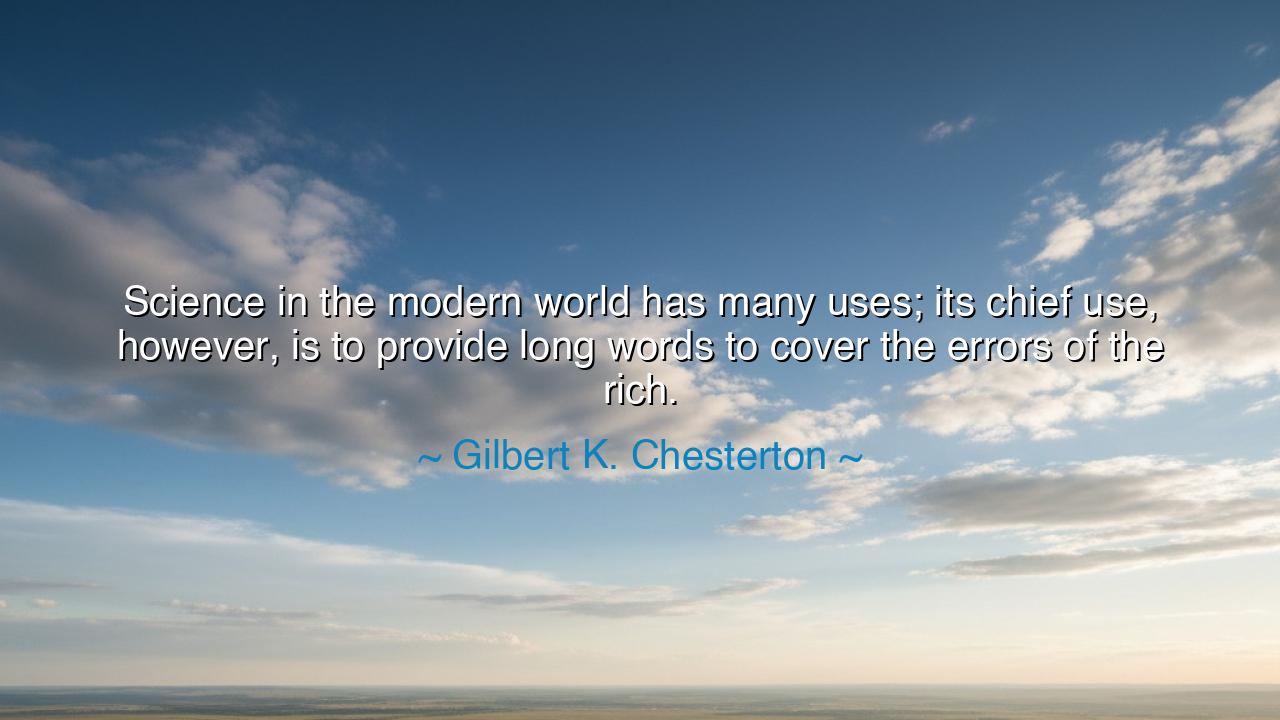
Science in the modern world has many uses; its chief use
Science in the modern world has many uses; its chief use, however, is to provide long words to cover the errors of the rich.






Listen well, O children of wisdom, for I bring to you the words of Gilbert K. Chesterton, a man whose keen insight into the nature of science and society remains relevant to this day. “Science in the modern world has many uses; its chief use, however, is to provide long words to cover the errors of the rich.” In these words, Chesterton reveals a deep truth about the misuse of knowledge and technology in the modern world—a truth that speaks to the way in which science can be manipulated to justify the actions of those who hold power and wealth. He suggests that, rather than using science to serve the common good, it is often employed to mask the mistakes and moral failings of the elite.
In the ancient world, the philosophers understood that knowledge was a double-edged sword. Plato warned that wisdom could be used for both good and ill, and that the power of knowledge could easily corrupt those who sought it for selfish purposes. The philosopher-king, in Plato’s vision, was a ruler who sought truth not for personal gain, but for the betterment of all. Chesterton speaks to a similar corruption in his critique of science in modern times. He warns that those who have power—those who control wealth and resources—have often used science not as a means of serving humanity, but as a tool to protect their own interests, to mask their failures, and to maintain their dominance.
Consider the history of corporate America in the 20th century, when industries grew exponentially, often at the expense of the common good. The advent of chemicals and pesticides in farming, for example, promised to revolutionize agriculture and feed the world. Yet, in many cases, these chemicals were used recklessly, causing long-term environmental damage and health crises. Companies that made fortunes from these innovations often used scientific jargon and technical language to obscure the dangers of their products, creating confusion and shielding themselves from accountability. In this way, the science that should have served the public good was instead used to protect the wealthy interests of those who profited from it.
Chesterton’s words also bring to mind the story of the tobacco industry, which, for decades, used scientific research to downplay the dangers of smoking. The wealthy tobacco magnates sponsored studies that cast doubt on the clear link between smoking and lung cancer, creating confusion in the public mind. In this case, science—once a beacon of truth—was manipulated to serve the interests of those who had the power to profit from deception. This is what Chesterton refers to when he speaks of the “long words”—scientific terminology that obscures rather than clarifies the truth.
The lesson here, O children, is one of awareness and discernment. Science is a powerful tool, capable of unlocking the mysteries of the world and improving human lives. But it is also a tool that can be wielded for self-interest and manipulation. Chesterton reminds us that the rich and powerful have often used science to justify actions that harm others, to hide their errors, and to maintain their control over society. We must, therefore, be vigilant—critical of information and authority, even when it comes wrapped in the seemingly impartial language of science.
In your own lives, O children, learn to approach the knowledge that is presented to you with humility and discernment. Recognize that science, while a powerful source of truth, is not immune to manipulation. Whether it is in the realms of medicine, technology, or environmental science, understand that the forces at work are not always as pure as they seem. Be wary of those who use the language of science to obscure the truth, and seek the wisdom to see through the veil of misinformation.
So, O children, as you seek knowledge, remember that it is not always the powerful who have the best interests of humanity at heart. Science is not the property of the rich or the elite, but a tool that belongs to all of humanity. Use it with integrity, and seek not just facts, but truth—the deeper understanding that serves the common good, not the interests of the few. May you wield the power of knowledge wisely, and never allow it to be used to cover the errors of those who seek to profit from the suffering of others.






AAdministratorAdministrator
Welcome, honored guests. Please leave a comment, we will respond soon